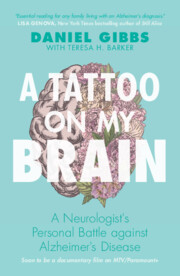Book contents
- A Tattoo on My Brain
- Reviews
- A Tattoo on My Brain
- Copyright page
- Dedication
- Contents
- Acknowledgments
- Introduction
- Prologue
- 1 Beacon Rock
- 2 Forewarned and Forearmed
- 3 The Smell of Baking Bread
- 4 Sneak Preview
- 5 A Stubborn Puzzle
- 6 The Locked Box and the Family Tree
- 7 The Measure of Memory
- 8 Orcas Nonetheless
- 9 My Brain, My Self
- 10 The Reveal
- 11 Cognitive Reserve and Resiliency: Brain Cells in the Bank
- 12 My Experimental Life
- 13 When ARIA Is More than an Operatic Solo
- 14 My Experiential Life: Living with Early-Stage Alzheimer’s Disease
- 15 Madeleines, Music and African Doves
- 16 It’s Only Scary If You Look Down
- 17 Beyond DNA: Family History Reconsidered
- 18 News at 5: Retired Neurologist Battles Alzheimer’s
- 19 The Forest, the Trees and the Ground Beneath My Feet
- 20 What’s in a Name? Alzheimer’s Reimagined
- 21 A Meaningful Outcome
- Epilogue: The Writing Life
- Epilogue: The Writing Life, Act II
- Appendix:
- Resources
- Index
- References
15 - Madeleines, Music and African Doves
Published online by Cambridge University Press: 12 November 2022
- A Tattoo on My Brain
- Reviews
- A Tattoo on My Brain
- Copyright page
- Dedication
- Contents
- Acknowledgments
- Introduction
- Prologue
- 1 Beacon Rock
- 2 Forewarned and Forearmed
- 3 The Smell of Baking Bread
- 4 Sneak Preview
- 5 A Stubborn Puzzle
- 6 The Locked Box and the Family Tree
- 7 The Measure of Memory
- 8 Orcas Nonetheless
- 9 My Brain, My Self
- 10 The Reveal
- 11 Cognitive Reserve and Resiliency: Brain Cells in the Bank
- 12 My Experimental Life
- 13 When ARIA Is More than an Operatic Solo
- 14 My Experiential Life: Living with Early-Stage Alzheimer’s Disease
- 15 Madeleines, Music and African Doves
- 16 It’s Only Scary If You Look Down
- 17 Beyond DNA: Family History Reconsidered
- 18 News at 5: Retired Neurologist Battles Alzheimer’s
- 19 The Forest, the Trees and the Ground Beneath My Feet
- 20 What’s in a Name? Alzheimer’s Reimagined
- 21 A Meaningful Outcome
- Epilogue: The Writing Life
- Epilogue: The Writing Life, Act II
- Appendix:
- Resources
- Index
- References
Summary
Musing from his sickbed, Marcel Proust in his 1913 semi-autographical novel Remembrances of Things Past (A` la recherche du temps perdu) famously described the vivid retrieval of a long-lost memory evoked by the smell and taste of a tea-soaked madeleine cake. His childhood memory of cherished Sunday mornings in the country, his aunt Le´onie, and now the rush of memory itself was an exquisite pleasure, he wrote. “And all from my cup of tea.” The Proust effect, as it has come to be called, refers to the phenomenon most of us have experienced, in which sensory cues instantly take us back to a long-ago memory.1
Modern science has since established that taste and smell cues are perhaps the strongest stimuli for retrieving old memories.
- Type
- Chapter
- Information
- A Tattoo on my BrainA Neurologist's Personal Battle against Alzheimer's Disease, pp. 120 - 130Publisher: Cambridge University PressPrint publication year: 2023



